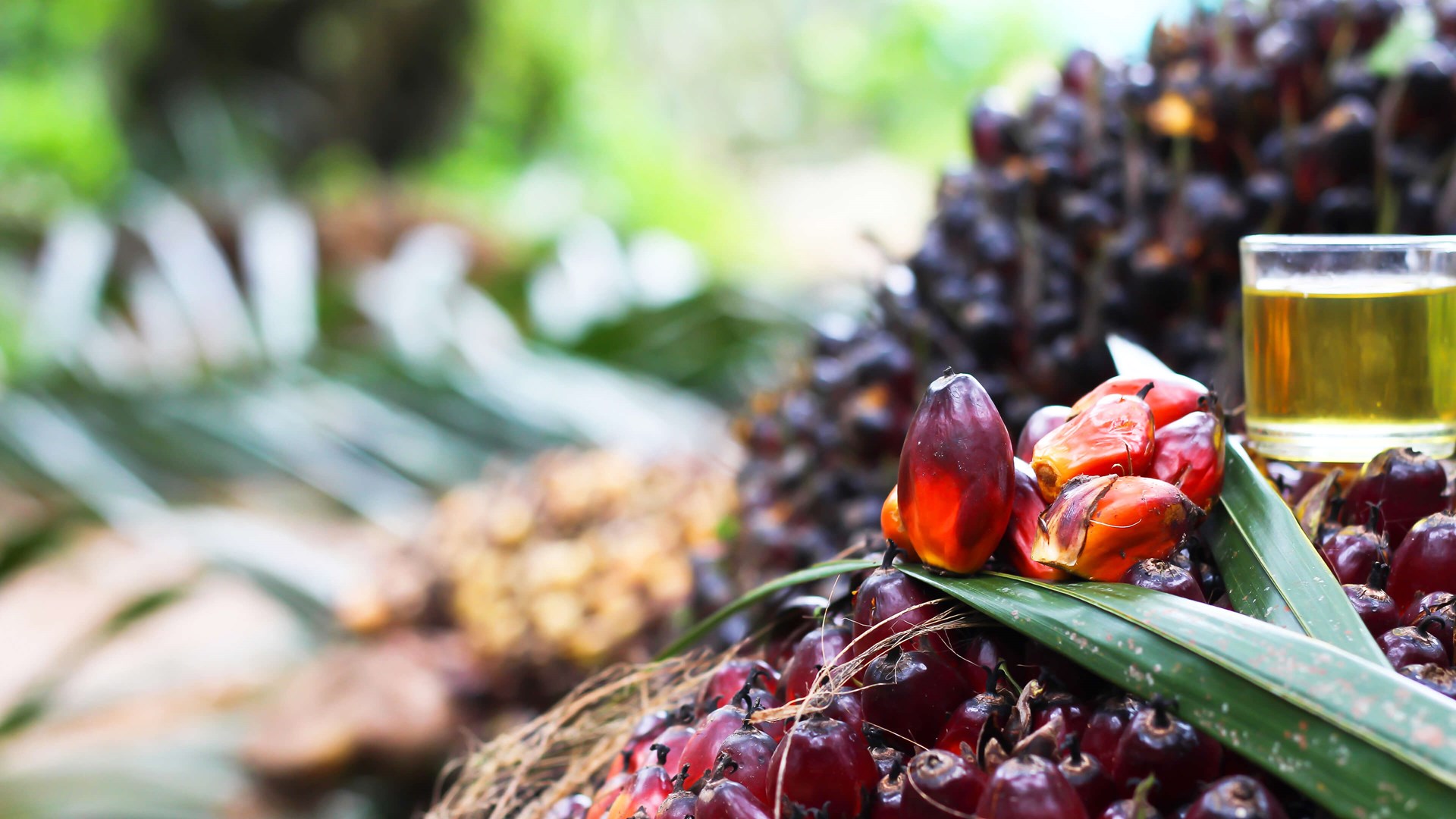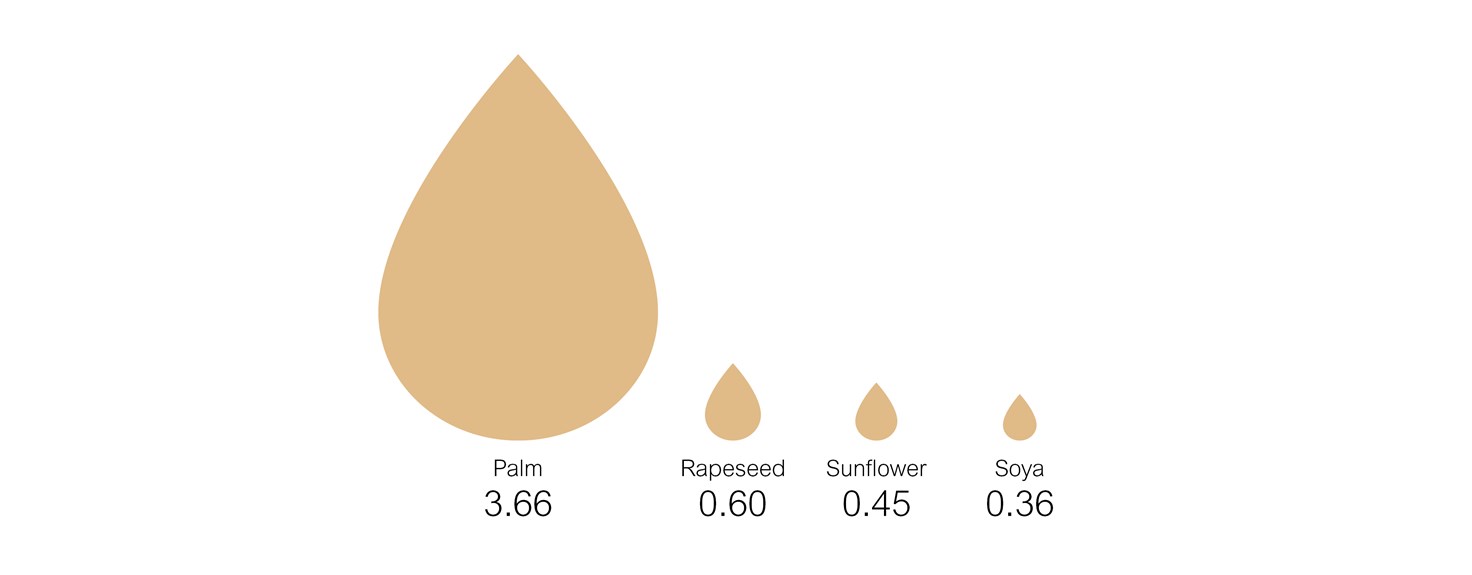
Awareness-raising activities increase requests for certified sustainable palm oil in 2018
Throughout the years, we have invested in awareness-raising activities to promote responsible sourcing and procurement of Certified Sustainable Palm Oil (CSPO). Our efforts have been fruitful, as customer requests for our SG-certified sustainable palm oil continuously increase year upon year. In 2019, we saw a 13 percent rise in sales of our SG- and MB-certified sustainable palm oil compared with the previous year.
Having been a member of the Roundtable on Sustainable Palm Oil (RSPO) since 2008, we renewed our RSPO certification in 2018. This process occurs every five years and involves educating employees about the significance of responsible cultivation and sourcing of palm oil. Being a member also means we are subject to annual audits by an independent, RSPO-accredited auditor.
Making sustainable palm oil the norm
The RSPO is a non-profit organisation that brings together stakeholders from all seven sectors of the palm oil industry’s supply chain, including:
- Oil palm producers
- Processors/traders
- Consumer goods manufacturers
- Retailers
- Banks/investors
- Environmental and social non-governmental organisations (NGOs)
Collectively, they have shared their experiences and expertise to create global standards for the sourcing and use of sustainable palm oil.
The RSPO’s mission is to make the use of sustainable palm oil the industry norm. Palm oil is a low-cost, highly versatile oil with application in many industries, yet commercial plant oil production comes with a myriad of social and environmental implications. This is why the RSPO has developed compliance criteria to address these issues.
Deciphering code
With all these letters flying around, it can get confusing as to what it all means! Put simply, palm oil can be processed or traded through one of four supply chain models: Identity Preserved (IP), Segregation (SG), Mass Balance (MB) or Book and Claim (B&C). Below is a summary of the four models:
| Identity Preserved (IP) | Segregation (SG) | Mass Balance (MB) | Book and Claim (B&C) |
| CSPO from individual mills is kept segregated from other certified and conventional palm oil | CSPO is not mixed with other oils | CSPO can be mixed with conventional palm oil. The volume in and the volume out needs to be the same | Manufacturers and retailers can buy credits from RSPO-certified growers, crushers and independent smallholders |
Partnering for sustainable palm oil
In addition to our RSPO membership, we actively engage with the European Palm Oil Alliance (EPOA), which supports 100 percent sustainable palm oil uptake by industry. This business initiative educates stakeholders on the palm oil story from start to finish and works closely with national initiatives throughout Europe. Its communications are science-based with the aim of presenting a balanced view on the nutritional and sustainability aspects relating to palm oil.
Our Danish roots place us in a solid position for making meaningful impact in the area of sustainable palm oil. The Danish Ministry of Environment and Food represents the Danish government in the Amsterdam Declarations Partnership, a Europe-based initiative that aims to combat the effects of deforestation through promoting the use of sustainable commodities, including palm oil.
To support this collaborative effort, the Confederation of Danish Industry introduced a voluntary initiative where member companies committed to sourcing 100 percent SG-certified palm oil by 2018. Member companies signed a declaration and as part of this, agreed to report on their palm oil consumption.
The initiative is supported by a task force that handles member reporting and contributes to the promotion of sustainable palm oil. We are the only manufacturing company in Denmark that participates in the task force and we hope that others will join us in due course.
The Danish Chamber of Commerce is further strengthening the sustainable palm oil movement by encouraging companies to define their individual targets for the use of CSPO.
Palm oil stands tall
Why make a big fuss about palm oil? When properly cultivated, palm oil is considered to be the most sustainable, best-functioning vegetable oil on the planet. In fact, palm oil has several built-in sustainability advantages, including year-round production, a long productive lifespan (over 20 years), the highest yield per hectare of any vegetable oil crop and the highest energy efficiency. Production that complies with RSPO criteria convincingly addresses a broad range of environmental and human rights issues that have plagued palm oil, soy bean and other crop types.
Responding to consumer preferences
Some consumers are uncertain about the differences in palm oil sources, and therefore choose to avoid palm-based ingredients altogether even if it is, ultimately, a move away from the most sustainable path. To cater for this market need, we have developed a range of non-palm emulsifier solutions.
Offering non-palm alternatives that use less sustainable raw materials goes somewhat against the grain at Palsgaard. However, we are determined that, if non-palm products are going to gain market share, then they should be available with the same strict attention to responsible supply chain practices and CO2-neutral production as our other emulsifier products.




